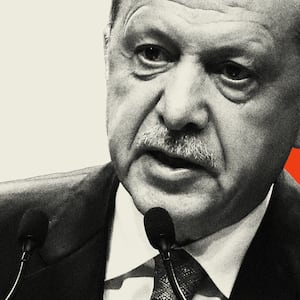ISTANBUL—Turkish opposition officials say their supporters will take to the streets in “massive protests” if President Recep Tayyip Erdogan follows through on his threat not to concede power if he loses this Sunday’s presidential election.
Erdogan has implied that his main challenger, Kemal Kilicdaroglu of the secularist Republican People’s Party (CHP), is being supported by a Kurdish militia, the PKK, that has launched a decades-long insurgency in the country and is categorized as a terrorist organization by the Turkish government and the U.S.
“My people will not surrender this country to an individual who became president with the backing they received from Kandil,” Erdogan said at a rally last week, referring to a mountainous region in Iraq that the PKK operates from.
Kilicdaroglu has been endorsed by the pro-Kurdish party, the HDP, which has several members behind bars over terrorism charges. The government accuses the party of being connected to the PKK, which the HDP denies.
A top adviser to Erdogan, Mehmet Ucum, stated that a change in power would be a risk to the country’s “territorial integrity” and Erdogan’s coalition partner, Devlet Bahceli, said opposition officials could find “bullets in their bodies” or be jailed for life.
On Sunday, a day after Bahceli’s comments, violence broke out when ultranationalists threw rocks at a rally of a top CHP official, Istanbul Mayor Ekrem Imamoglu, who was campaigning in a town that voted for Erdogan in the 2018 presidential election.
Interior Minister Suleyman Soylu has repeatedly said the elections are a coup attempt by Western countries—which opposition officials say is preparing the ground for a refusal to concede defeat. “They’re trying to lay the basis to not accept a loss but it’s not something feasible even by Erdogan’s standards,” the U.S. representative for the CHP, Yurter Ozcan, told The Daily Beast.
Voters will cast ballots for both presidential and parliamentary elections on May 14 that polls suggest will be tightly contested.
Soylu has backed up his claim of “a political coup attempt” with video of President Joe Biden stating he would support the opposition to defeat Erdogan.
“We can support those elements of the Turkish leadership that still exist and get more from them and embolden them to be able to take on and defeat Erdogan,” Biden said to New York Times journalists while he was running for the presidency. “Not by a coup, but by the electoral process.”

Turkish President Tayyip Erdogan addresses his supporters during a rally in Istanbul, Turkey.
Umit Bektas/ReutersErdogan’s office did not respond to requests for comment by The Daily Beast on whether he was considering not accepting defeat.
Kilicdaroglu last Tuesday accused members of the president’s communications office of using the “dark web” and “playing Cambridge Analytica,” without providing examples. Cambridge Analytica was a British firm that collated users’ information from Facebook to influence voters for election campaigns in the U.S. and U.K.
The Twitter account of Fahrettin Altun, the director of the president’s communications office, responded that its priority is fighting disinformation and the fact the CHP leader was uncomfortable with Altun showed that his office was “on the right track.”
“If Erdogan tries to not recognize the results, I think there’s going to be massive protests across Turkey, in democratic fashion, for people to defend their democratic rights,” Ozcan warned.
Worst-case scenario
After Erdogan’s party lost the mayoral election in Istanbul in 2019 by about 15,000 votes, the country’s High Election Board called for a re-run, stating that a law had been broken over polling stations. The opposition stated it was an attempt to not recognize the results of a legitimate election. The CHP’s candidate, Ekrem Imamoglu, won the re-run by more than 800, 000 votes.
Ozcan has said he believes the police and military would not help Erdogan if he tried to use them to remain in power in the event of an election loss.
During a television interview with the CHP candidate Kilicdaroglu in January, a commercial was played for a military company (SADAT) that he has accused of being a paramilitary group connected to Erdogan. “He may consider using various vehicles or agents but my bottom line is that it’s just not going to work,” Ozcan said.
Sinan Ogan, an ultranationalist presidential candidate, said Erdogan’s recent comments about Kilicdaroglu also led him to believe the Turkish president may not step down, especially if the opposition wins by a narrow margin. Ogan said that Erdogan connecting the pro-Kurdish HDP’s support for Kilicdaroglu with the PKK is “dangerous.”
A candidate needs to have 50 percent plus one vote in order to win the election, otherwise it goes to a second round. Some pollsters believe that is likely, especially with the candidacy of Ogan and a secularist politician possibly acting as spoilers and taking secular and nationalist votes away from Kilicdaroglu’s ideologically broad main opposition alliance.
Both Ogan and the CHP’s Ozcan said that an opposition candidate winning in the first round would help ensure stability in the country. “If the elections don’t conclude democratically, the Turkish people will use their democratic right to protest,” Ogan said.
When asked if he was concerned whether Erdogan would use force to stay in power, Ogan responded, “Let’s rephrase it from using the word ‘force,’ but we can call it some set of destabilizing situations.”
As an example, he cited unrest in 2015 when elections led to Erdogan’s Justice and Development Party (AKP) losing its parliamentary majority after the HDP won seats in the parliament for the first time. Violence erupted in the heavily Kurdish southeast and the HDP’s leader, who was later imprisoned, accused the government of inaction in order to convince the country that it needed the AKP ahead of a snap election five months later.
The HDP said it faced 140 attacks and more than a hundred died at pro-Kurdish rallies by bombings that were blamed on ISIS. After Erdogan’s party surprisingly won nearly 50 percent of the vote in November that year, he said voters had chosen “stability” and “unity.”






